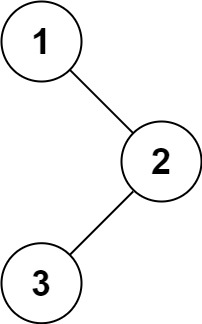source: https://leetcode.com/problems/binary-tree-inorder-traversal/
C/C++ Solution to LeetCode problem 94. Binary Tree Inorder Traversal.
Problem
Given the root of a binary tree, return the inorder traversal of its nodes’ values.
Examples
Example 1:
Input: root = [1,null,2,3]
Output: [1,3,2]
Example 2:
Input: root = []
Output: []
Example 3:
Input: root = [1]
Output: [1]
Constraints
- The number of nodes in the tree is in the range
[0, 100]. -100 <= Node.val <= 100
Follow up: Recursive solution is trivial, could you do it iteratively?
Solution
Two solutions:
- Recursively:
- First call recursively for the left node.
- Add the value of the node to the result.
- Call recursively for the right node.
- Iterative:
- Using an stack:
- Push the root node.
- While the stack is not empty:
- Get the top node.
- Push its
leftnode if it hasn’t been visited. - Mark the node as visited (for this case, we will use a
setto track the visited nodes). - Continue until no left nodes are available.
- Push its
- Pop the node and add its value to the result.
- If the node has a right node, push it to the stack.
- Get the top node.
Solution 1
1
2
3
4
5
6
7
8
9
10
11
12
13
14
15
16
17
18
19
20
21
22
23
24
25
26
27
28
/**
* Definition for a binary tree node.
* struct TreeNode {
* int val;
* TreeNode *left;
* TreeNode *right;
* TreeNode() : val(0), left(nullptr), right(nullptr) {}
* TreeNode(int x) : val(x), left(nullptr), right(nullptr) {}
* TreeNode(int x, TreeNode *left, TreeNode *right) : val(x), left(left), right(right) {}
* };
*/
class Solution {
void traverse(TreeNode* node, vector<int>& result) {
if (node == nullptr)
return;
traverse(node->left, result);
result.push_back(node->val);
traverse(node->right, result);
}
public:
vector<int> inorderTraversal(TreeNode* root) {
vector<int> result;
traverse(root, result);
return result;
}
};
Solution 2
1
2
3
4
5
6
7
8
9
10
11
12
13
14
15
16
17
18
19
20
21
22
23
24
25
26
27
28
29
30
31
32
33
34
35
36
37
38
39
40
/**
* Definition for a binary tree node.
* struct TreeNode {
* int val;
* TreeNode *left;
* TreeNode *right;
* TreeNode() : val(0), left(nullptr), right(nullptr) {}
* TreeNode(int x) : val(x), left(nullptr), right(nullptr) {}
* TreeNode(int x, TreeNode *left, TreeNode *right) : val(x), left(left), right(right) {}
* };
*/
class Solution {
public:
vector<int> inorderTraversal(TreeNode* root) {
if (!root)
return {};
vector<int> result;
stack<TreeNode*> st;
set<TreeNode*> visited;
st.push(root);
while(!st.empty()) {
TreeNode *t = st.top();
if (visited.find(t) == visited.end() && t->left) {
st.push(t->left);
visited.insert(t);
continue;
}
st.pop();
result.push_back(t->val);
if (t->right)
st.push(t->right);
}
return result;
}
};

